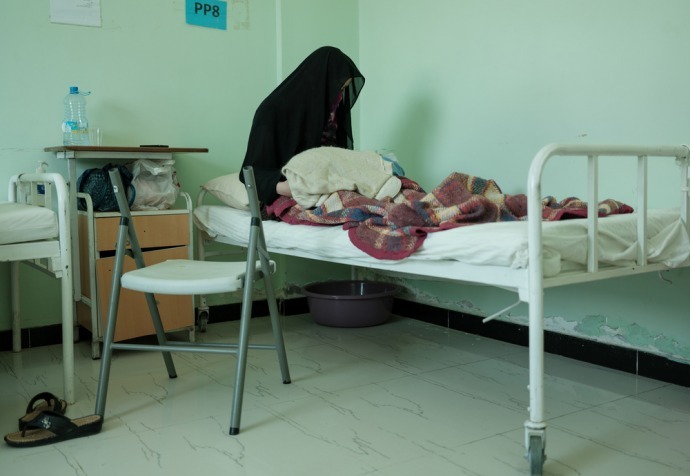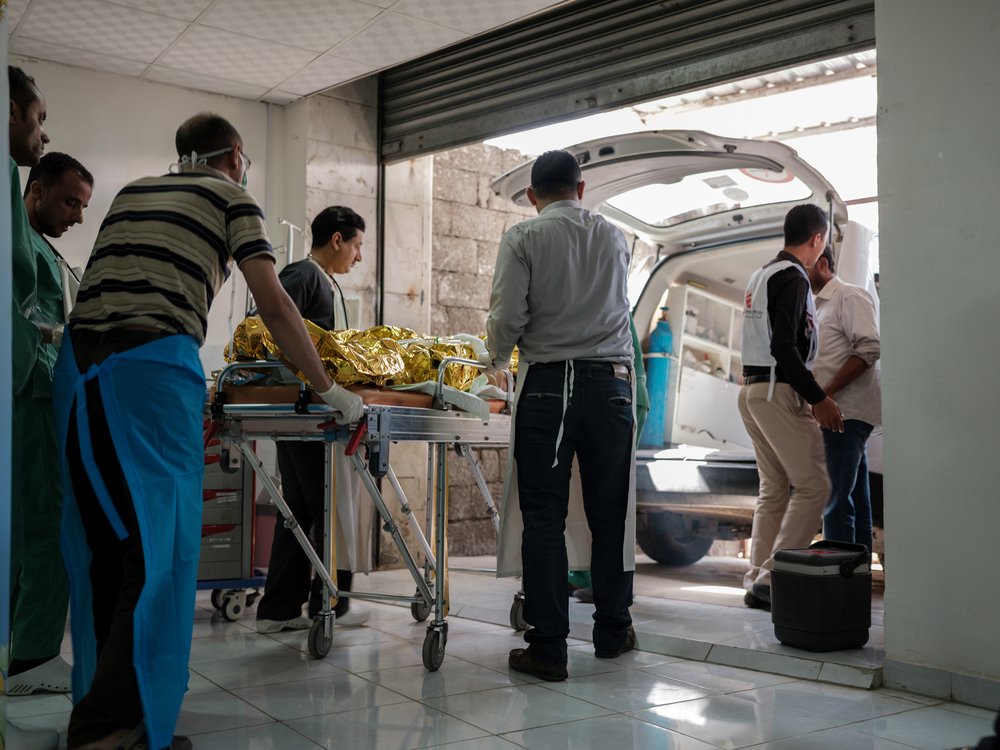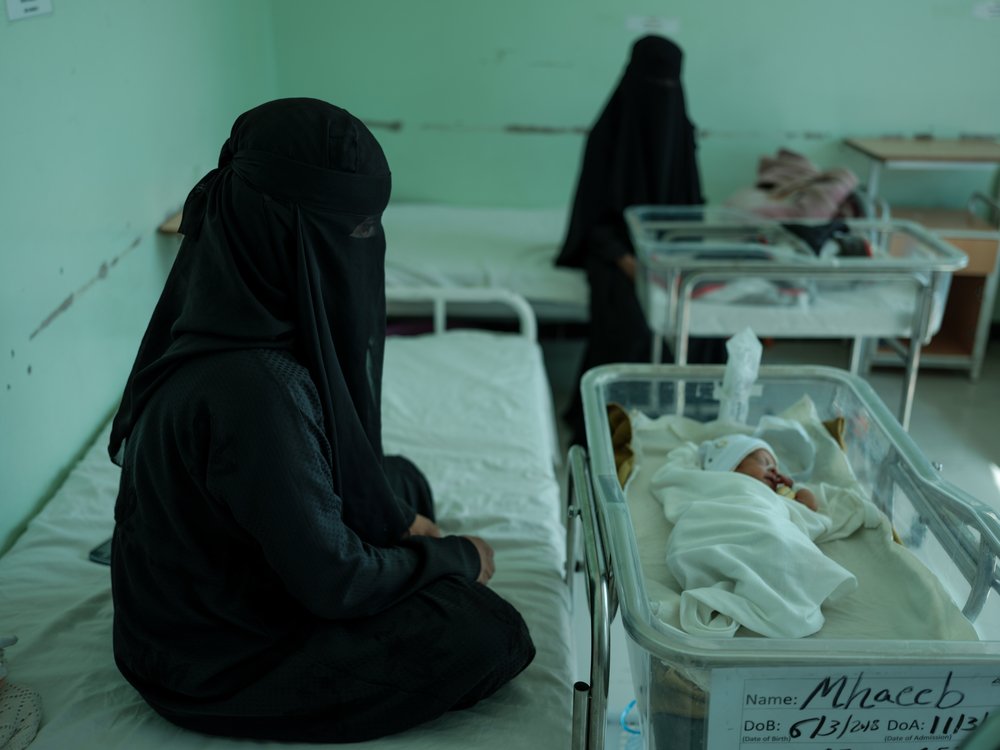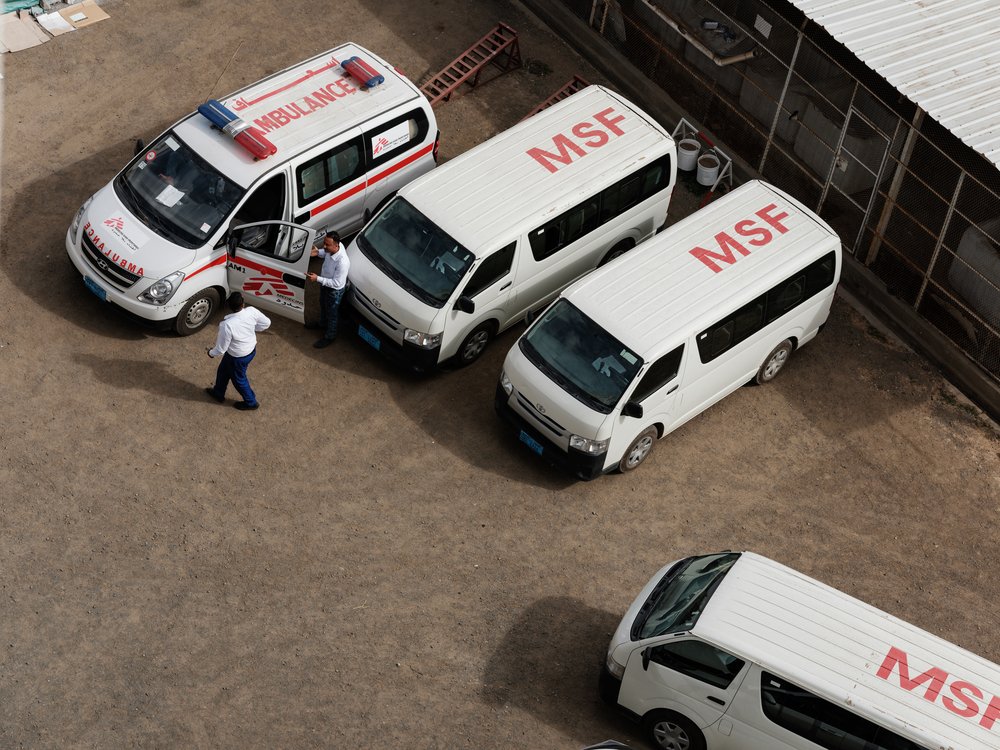- Public infrastructure in Yemen is highly fractured and social, education and health services are not always available
- MSF’s mother and child health hospital in Taiz is the only centre providing free healthcare to a surrounding population of 600,000 people
- MSF is running an inpatient and outpatient feeding program to meet the increasing needs
- Many children are living with the long-term consequences of untreated and undiagnosed medical conditions
Yemen: “It is obvious that the people are suffering extreme stress.”
Dr Annie Whybourne is an Australian paediatrician, currently on her third field assignment with MSF in Taiz, Yemen.

A Yemeni woman in the mother and child Hospital in Taiz. © Matteo Bastianelli/MSF
Travelling to the MSF hospital in Taiz involves flying from the tiny country of Djibouti in the horn of Africa, northeast across the Red Sea to Sana’a in Yemen, then driving some eight hours southeast to the outskirts of Taiz near the frontline. We travel up and down through the most amazing – and very steep – mountain-scapes, past numerous villages perched on mountain sides or in lush valleys, and through several bustling towns and checkpoints.
The sights are many and varied. There are lots of different ethnic groups as a result of Yemen’s diverse history. You see proud older men in traditional dress with their short-curved ‘jambiya’ (daggers) tucked into their belts; women in their black abayas and headscarves, some in colourful gowns and scarves; many young fellows with Kalashnikovs bouncing around on their shoulders; goats, camels, tiny heavily laden donkeys, chickens and a plethora of ancient and battered cars. The agriculture is abundant but sadly it is apparent that a large portion of it is dedicated to qat production (a stimulant plant produced locally). There’s lots of fresh fruit and vegetables in the markets and endless coloured plastic bags strewn all over the countryside.

Staff at the entrance of the trauma centre in the mother and child hospital prepare a patient to be transferred. © Matteo Bastianelli/MSF
It is obvious that the people of Taiz city and suburbs, and the surrounding villages, are suffering extreme stress in their lives. Feeding and supporting a family is very difficult, and the exchange rate is soaring daily. Public infrastructure is highly fractured so that power, water, sewerage, garbage collection, education and health services are not always available.
Throughout the country, many doctors, nurses and other staff have continued to work in public hospitals and health centres without salaries for over 18 months, with almost no equipment or supplies to offer adequate care. Public services are available to some extent because of private providers with generators and water trucks, and MSF providing healthcare and support for public infrastructure. Many people have fled to Taiz to seek refuge after they have been displaced from their own villages and live with relatives or survive in tents in the hills nearby.
MSF’s maternal and child health hospital in Taiz, Al-Houban district, has been operational since 2015. It is the only centre providing free maternal and child healthcare to a surrounding population of 600,000, as the local government hospitals are mostly non-functional, or cut-off by the frontline. It is a very hectic health facility, and every month on average we see 2,500 outpatients, 700 patients at the emergency department, more than 550 babies delivered and 200 paediatric admissions! We also have a neonatal nursery with 36 beds, oxygen, antibiotics, suction, warmth and medication.
It is becoming increasingly difficult to meet the needs of the community. The demand for nutritional support is growing; and while food is available not all locals have the money to buy it, especially at such inflated prices. We run a busy inpatient and outpatient feeding program. Every day I am confronted and disturbed by extremely malnourished children, with wide-eyed emotionless stares, and with mothers who are obviously suffering the pain of trying to care for such a child. It is hard to imagine how their tiny bodies hang on to life. Recently, we admitted an eight-month-old boy who weighed just 1.5kg with cholera and an underlying untreated congenital heart problem. Rehydrated, he weighed only 1.9kg.

Every month on average MSF sees 2,500 outpatients through the hospital in Taiz and more than 550 babies delivered. © Matteo Bastianelli/MSF
I am moved by stories from mothers who I have the privilege to know through our wonderful translators. A mother came with her 18-month-old boy, who had suffered an acute collapse. She suspected correctly that he had suffered internal bleeding, because three of her four sons had already died from bleeding complications associated with haemophilia – an inherited blood disease where the blood is not able to clot properly. She had three daughters who were well. She was a very capable woman who had sought as much education as she could as a child but had to leave school at the age of 12 to marry.
Before the war, the family had been buying Factor 8 – the blood-clotting protein that cannot be made by people who suffer from haemophilia. It was costly, and while the mother was giving it to her boys intravenously at home, it was at a far lower dose than would be needed to prevent haemorrhage occurring from very minimal trauma. This boy survived his brain haemorrhage with supportive care at our hospital, he regained consciousness, but had suffered damage to his brain and still needed full-time care daily. His loving mother took him home to the village to feed him with nasogastric blended foods and attend to his needs.
In Yemen there are a lot of children who present with the long-term consequences of untreated and undiagnosed medical conditions. Many babies arrive at the emergency room, having been born at home in the village or at some sort of private health facility, with neonatal asphyxia and/or sepsis, often severely ill or dead on arrival. The family have often travelled for many hours in private transport to get to the hospital. My paediatric ability is being challenged daily and I am extremely grateful for all the wonderful mentoring and experience that I have had in my training and work over many years.

MSF ambulances parked in the courtyard of the hospital. © Matteo Bastianelli/MSF
